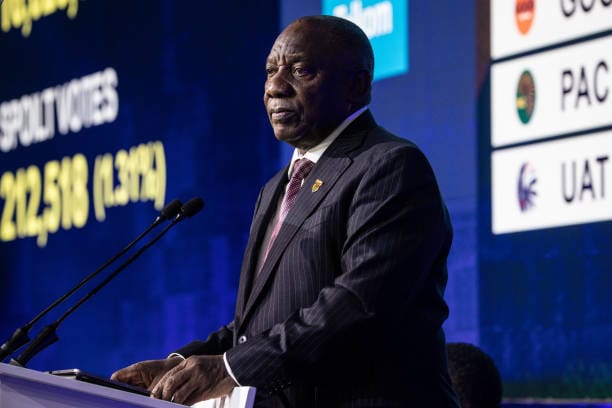JOHANNESBURG, South Africa — President Cyril Ramaphosa urged South Africa’s political parties to overcome their differences and find “common ground” to form the first national coalition government in the country’s young democracy. His comments came immediately after the final election results confirmed that no party won a majority in last week’s vote. The unprecedented coalition talks are now set to begin to chart a way forward for Africa’s most industrialized economy.
The African National Congress (ANC), led by Ramaphosa, had already lost its 30-year majority, with over 99% of votes counted by Saturday showing it couldn’t surpass 50%. The ANC received just over 40% of the votes, the largest share, but still short of a majority.
Without a majority, the ANC will need to negotiate a coalition with another party or parties to co-govern and re-elect Ramaphosa for a second term. In South Africa’s parliamentary system, the national elections decide how many seats each party gets in Parliament, and lawmakers then elect the president.
“Our people have spoken,” Ramaphosa said. “Whether we like it or not, they have spoken. We have heard the voices of our people, and we must respect their choices and their wishes. … The people of South Africa expect their leaders to work together to meet their needs. This is a time for all of us to put South Africa first.”
The ANC, which freed South Africa from apartheid under Nelson Mandela in 1994, had governed with a comfortable majority ever since. This election, however, saw an unprecedented slump in its support as voters expressed their dissatisfaction with the party’s failure to address widespread poverty, extremely high unemployment levels, and issues with delivering basic government services.
The ANC announced it was starting negotiations with all major parties. More than 50 parties participated in the election, with at least eight securing significant shares of the vote. At least 26 of them, including the MK Party led by former President Jacob Zuma, have lodged objections and complaints with the electoral body, alleging voting irregularities.
ANC Secretary-General Fikile Mbalula said the party was open to all negotiations, including with the main opposition Democratic Alliance (DA), which has long criticized the ANC but is viewed by analysts as the most stable coalition option for South Africa. The DA won the second-most votes with 21.8%, and the two parties together would hold a majority, enabling them to govern.
DA leader John Steenhuisen said his party was also initiating talks with other parties. The ANC won 159 seats in the 400-seat Parliament, down from 230 in the last election, while the DA increased slightly to 87 seats.
There is some urgency for coalition talks to progress, as the new Parliament needs to sit for the first time and elect a president within 14 days of the election results being declared.
Ramaphosa is seeking a second and final term, and Mbalula affirmed that his position as ANC leader was not in question despite the election result. Mbalula dismissed demands by Zuma’s MK Party that Ramaphosa step down as a condition for coalition talks.
“No political party will dictate terms to us, the ANC. They will not … You come to us with that demand, forget (it),” Mbalula said. He added that the ANC would not be arrogant, saying, “The elections have humbled us, they have brought us where we are.”
South Africa is a leading voice for its continent and for the developing world on the global stage and is due to take over the presidency of the Group of 20 rich and developing nations later this year. It’s the only African nation in that group.
“Everyone is looking to see if South Africa can weather the storm and come out the other side,” political analyst Oscar van Heerden said on the eNCA news network.
Among many coalition options, the ANC could also join with MK and the far-left Economic Freedom Fighters, although such a coalition might unsettle investors due to their pledges to nationalize parts of South Africa’s economy. The DA has long refused to work with the EFF and MK, calling them a “doomsday coalition” for South Africa. Steenhuisen reiterated that stance but said his party was starting talks with others with “cool heads and open minds.”
Political analyst van Heerden suggested that an ANC-DA coalition could bring stability, though there may be resistance within the ANC. Smaller parties might also be included to make the coalition more acceptable to ANC members. “The next few days are going to be a very difficult period. People will have to be mature behind closed doors,” van Heerden said.
https://www.africanexponent.com/ramaphosa-calls-for-unity-as-south-africa-faces-historic-coalition-talks/


